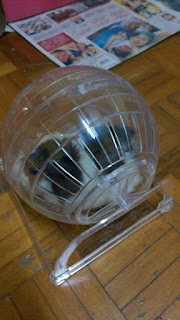Guinea Pigs
Guinea Pig, or cavies are small mammals originated from the
South America. They enjoyed a widespread of popularity as a household pet due
to their docile nature and responsiveness to handling and feeding which make
them relative ease to manage them. Therefore, today we will introducing “Uncle”
and “Aunty” which are two guinea pigs belong to one of our friend.
 |
| Uncle - The male guinea pig |
 |
| Aunty - The female guinea pig |
Guinea pigs can grow 20 to 25 cm in length and weight over
700 to 1200g. A typical guinea pig will
live an average of four to five years, but a well maintained guinea pig will
live as long as eight years. Guinea pigs rarely bite and are good pets for
children who are old enough to handle them with care and treat them with
respect. The most common breeds are the Smooth-Coated, Abyssinian and Peruvian.
Housing
A minimum space of eight square is all a guinea pig needs.
However, they are very sociable thus most owner will have a pair of guinea pig
which will double the amount of space. Besides that, they also have a sensitive
paw pads which means they will need a solid flooring instead of the
wire-bottomed cage. Other than that, guinea pig prefers a hiding place such as
plastic tubes or wooden boxes that are available in most of the pet supply
stores.
 |
| Plastic ball for them to exercise |
Commercial guinea pig pellets will fulfil a guinea pig’s
diet. There are a variable of guinea pig pellets that could be obtain from any
pet supply stores. Most of these pellets are made from plants, seeds and
vegetables. It is recommended to feed a guinea pig twice a day. However, owners
should be aware that guinea pig cannot produce Vitamin C thus we should ensure
our guinea pig are able to gain enough of the Vitamin C by feeding them fruits
or vegetables that are high in C.
 |
| Normal guinea pig pellets |
Overall, guinea pigs will make a great start as a pet for
children that are ready to bear the responsibility because they are easy to
take care and with a lower cost of taking care.

No comments:
Post a Comment